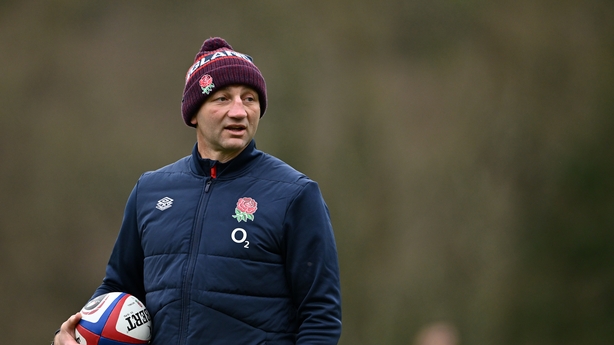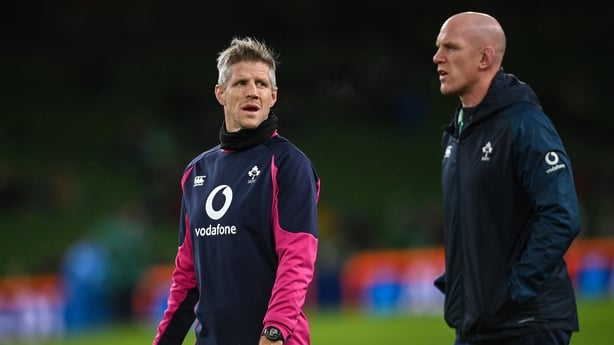Ireland and England's latest meeting, 150 years after their first, comes freighted with greater than average levels of uncertainty.
Viewed from this side of the water, the game has not appeared to be in rude health in England of late.
For a time there in 2022/2023, it began to look like they'd have no more clubs left, with historic entities like Wasps and London Irish going to the wall.
Most of the longstanding internationals, meanwhile, still seem to be working through their trauma from the Eddie Jones years, occasionally releasing a tell-all autobiography in which they detail what life was like inside the reign of terror. Some of them give the distinct impression they'll never be fully right again.
The portrait to emerge was that Eddie's caustic approach to man-management made Malcolm Tucker look like Mr Barrowclough from Porridge.
Between 2021 and 2023, they won six of 15 Six Nations matches, finishing fourth twice and fifth once, as poor a record as they've endured since the early 1970s.
Despite it all, they still got further than Ireland in the 2023 World Cup, a slightly comical turn of events which might have been funnier had our boys not been the butt of the joke.
Without raking over old sorrows, the draw couldn't have been kinder to England had it been conducted in secret in the Pall Mall Restaurant by Bill Beaumont and Clive Woodward.
Under's Jones' pointedly humble successor Steve Borthwick, England had adopted a parodically conservative gameplan, which reached its zenith in the World Cup semi-final when they almost toppled South Africa in miserable weather conditions. The match was a perversely compelling festival of caterpillar rucks and box-kicks, both sides treating possession as something to be rid of as soon as possible.
Humble off the field, the English forwards had been encouraged to lean into snarling obnoxiousness on it, celebrating each and every opposition knock-on as if they'd just won big at Cheltenham.
Anyone new to the sport that evening would have regarded it as a very strange ritual indeed. On the RTÉ Rugby podcast, a slightly intrigued Bernard Jackman dubbed it as being a form of "anti-play".

Their clubs that remain a going concern have been a mixed bag in European competition. Labouring under a comparatively tight salary cap, most of them struggled to make an impression, though Harlequins and Northampton Saints have performed well, reaching the semi-finals last year. However, no Premiership side has made a Champions Cup final in the last four editions of the competition.
Exeter Chiefs, the last European champions from England, winners in the Covid season, have this year shipped the kind of relentless beatings that used to be the preserve of your Zebres and your Bennettons.
Though you wouldn't think it, England boasts more European Cup success than Ireland, a legacy of a burst of titles in the early 2000s and the latter half of the 2010s, and the fact that Leinster have recently begun a tradition of losing finals.
Indeed, it'll probably come as a surprise to casual Irish rugby fans that Exeter have won the Champions Cup more recently than Leinster. The floating punter over here pays as much attention to the Champions Cup once Irish teams are eliminated as he or she does the English county cricket results.
In the national team set-up, there's been more coaching upheaval in the last 12 months, with Felix Jones abruptly leaving his post as defensive coach only seven months after taking the job, bizarrely at a time when England were seemingly making progress. Strength and conditioning coach Aled Walters upped sticks and joined the Irish set-up around the same time.
Still, as we discovered last year it behoves us to be wary of England when they're being written off.
Ireland were roaring favourites to complete a second successive Grand Slam before they came a cropper against a rejuvenated England in Twickenham, much to the obvious delight of neutrals everywhere as well as the vocal anti-rugby community on this island.
It was obvious from the opening minutes that the surrounding narrative had poked the bear. Tommy Freeman's early charge into Calvin Nash - which resulted in the Irish wing needing a HIA and opening the space for Ollie Lawrence to score in the corner - was unmistakably reminiscent of Manu Tuilagi's rampaging in the early seconds of the infamous 2019 loss in Dublin.
Back home, the pre-match mood of serene confidence dissipated in an instant and there was a collective sigh of 'uh-oh'.
In the end, Ireland could still have won it but were unable to halt one last England cavalry charge after a lineout on the halfway line and the winning drop goal opportunity was laid on a plate for Marcus Smith, who drilled his kick between the posts.
The loss put a massive dampener on Ireland's eventual Six Nations victory, which was finally sealed after a jittery win at home to Scotland the following week.
Andy Farrell seemed a bit miffed at the air of entitled indifference he sensed among the media corps that evening and spent his post-match interviews playing the hype-man to the latest trophy win.
In some respects, it was a sign of how far Irish rugby had come, that we were now celebrating Six Nations title victories in a perfunctory manner, like the Woodward-era England teams used to after they'd ballsed up the Grand Slam game. The ultimate sign of one's transition from underdog to overdog.
There was a sense of drift in Irish rugby for the remainder of 2024, which was only interrupted by the rousing win away over South Africa in Durban.
The November series was flat, in particular Ireland's error-ridden loss at home to New Zealand. This was followed by narrow-ish wins against Argentina and Joe Schmidt's Australia. Judging by the penalty count in November, the refereeing community seem to be on Ireland's case at the minute, a big turnaround from the 18 months prior to the World Cup.

The 22-19 win over Australia was the last with Farrell watching behind the perspex glass in the coaching booth, the head coach now consumed with the glamour gig of coaching the Lions, while Simon Easterby steps into the temporary Rob Howley role.
At provincial level, the increasing extent of Leinster's domination and their controversial signings of RG Snyman and Jordie Barrett are provoking resentment among the other three provinces. IRFU performance director David Humphreys admitted this week he was concerned about disillusionment setting in among the game's former heartlands beyond south Dublin.
With Sexton now long gone, Ireland has an old-fashioned out-half debate on its hands akin Campbell-Ward and O'Gara-Humphreys back in the day. This is all to the good, not least for the media.
Sam Prendergast had leap-frogged Jack Crowley in pecking order by November, but the Munster out-half has experienced a renaissance in recent weeks, with a scintillating performance away to Northampton just under a fortnight ago. No doubt we can expect opinions on the matter to break down along provincial lines.
Notwithstanding Ireland's unconvincing recent form, the bookies have England as outsiders and they've won just four times in Dublin since the turn of the century - one of which was a World Cup warm-up.
England have numerous issues but they have enough heft and natural talent, in the form of Ben Earl, Marcus Smith, Maro Itoje et al to upset the odds against the newly vulnerable defending champions.
Follow a live blog on Ireland v England in the Guinness Six Nations on Saturday from 4.45pm on rte.ie/sport and the RTÉ News app or listen to live commentary on Saturday Sport on RTÉ Radio 1






